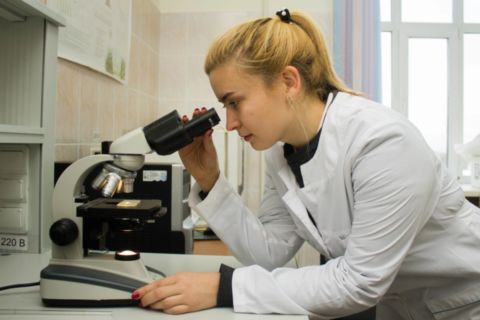Scientists at SUSU have synthesized new, complex platinum compounds and studied their use as drugs. They found that these compounds are less toxic and can potentially protect the enzymes in the human body that are attacked by chemotherapeutic drugs used to treat cancer.
Platinum complexes have unique properties that allow them to be used in many areas. In a joint study, researcher Alyona Zykova from the Non-conventional Materials and Resource-Saving Technologies Research Institute and co-author Professor Jurica Novak revealed that the new synthesized platinum (IV) and (II) complexes with organolammonium and organoltriphenylphosphonium cations preserve their potential as drugs while also being less toxic than existing compounds. The new compounds are capable of blocking the enzymes that are affected by chemotherapeutic drugs used in cancer treatment, and they may also become important agents in the treatment of viral infections such as HIV and SARS.
"Research has shown that the cytotoxicity of platinum molecular compounds is largely determined by the ligand environment, and compounds without significant toxicity can be obtained if the target complexes are properly adjusted. In this regard, we focused our interest on the synthesis of ionic platinum complexes with various organic substituents," explains one of the authors of the study, Candidate of Sciences (Chemistry) Alyona Zykova.
The computational part of the study was carried out in the Potemkin Research Laboratory for Computer Modeling of Medicines at SUSU. Machine learning models developed under the guidance of Vladimir Potemkin, who has been working on the design of new drugs using computer modelling for many years, were used in the study. The same method (combined with the use of deep neural networks) was used here to obtain new platinum compounds for preliminary assessment of their bioactivity against various diseases.

"The process of drug synthesis is still long and expensive. However, computer-based drug modelling techniques, combined with the tremendous growth in computing power in recent years, can provide a large number of advantages in modern drug development. We used the latest machine learning algorithm and deep neural networks to identify potential pharmacological applications of new platinum complex compounds. Our research opens the door to the development of selective drugs with minimal (or, ideally, without) side effects. And this approach can also significantly speed up drug development and reduce its cost," said Jurica Novak, Doctor of Sciences (Chemistry).
This research was supported by the Government of the Russian Federation (Decree No. 211, Agreement No. 02.A03.21.0011) and the Ministry of Science and Higher Education (FENU-2020-0019).
The study results were published in the journal Bioimpacts (Q2). A second publication is currently being prepared in collaboration with scientists from India, which will combine the synthesis of platinum complexes and calculations with predictions of biological activity and experimental studies in vitro and in vivo.
South Ural State University is a university of transformations, where innovative research is conducted in most of the priority fields of science and technology development. In accordance with the strategy of scientific and technological development of the Russian Federation, the university is focused on the development of big scientific interdisciplinary projects in the field of digital industry, materials science, and ecology. In 2021 SUSU became the winner in the competition under the Priority 2030 program. The university acts as a regional project office of the World-class Ural Interregional Research and Education Centre (UIREC), which is aimed at solving the tasks of the Science and Universities National Project.
Mass media about us:
- Naked Science: Russian Researchers Propose the Use of Complex Platinum Compounds to Create New Drugs
Read our news:




